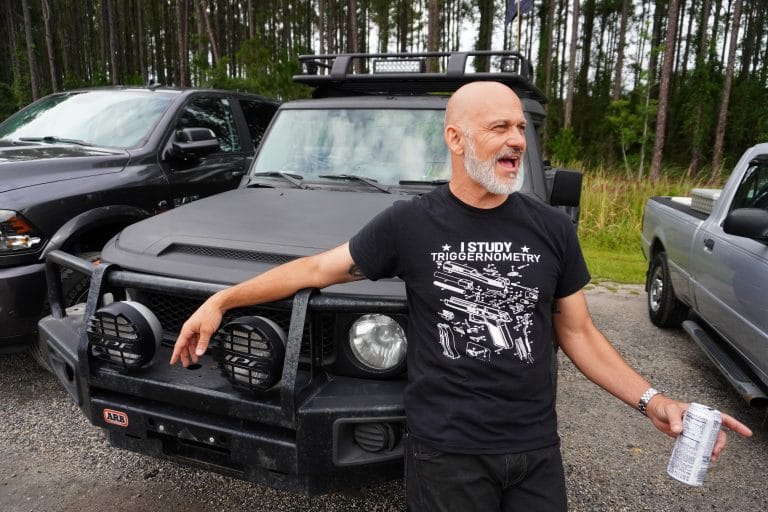In this final section of his interview with Stephen Gutowski, gun-rights advocate Rob Pincus makes the case that he’s helping by being a gadfly in the gun community. He argues the responsibility of gun owners goes hand-in-hand with their rights, and so it’s critical that gun advocates address tough issues such as negligence. But he also defends himself against the idea that he’s courted controversy or actively tried to irritate others in the gun-rights movement. Rather, he says it’s about policing his own side in order to get results.
Pincus has high hopes for what can be accomplished in the cause of gun rights. He says his goal is to push gun control far enough to the fringes that neither major party can maintain an anti-gun agenda. He thinks that will take serious self-policing and a heavy dose of influence but it’s a goal worth having. The intentions he has for his activism are where we begin.
The following is the last section of Gutowski’s conversation with Pincus, lightly edited for clarity and exclusive for members:
Stephen Gutowski: Where do you see your activism headed over the next several years? What are your key areas of focus? What issues really animate you moving forward?
Rob Pincus: I act, I know, as a little bit of a gadfly to the gun community. Have for a long time. I did it at first very centered in the training community, and now more of the gun community at large. And I don’t shy away from that role. And in some ways, I enjoy it. I think that somebody needs to be there to raise their hand when we say there are 2 million defensive gun uses every year and say, “That’s a made-up number.” And especially when it’s usually reported as 500,000 to 2 million. You now have 400% of your original number—that’s not even a statistic. It’s just a made-up number. So what are we really saying? When we make it too easy for the other side to attack us or to dismiss our arguments, we hurt ourselves. That’s a disservice to the gun community.
When we say things that the only people that even want to hear it or accept what we’re saying are already on our side, we’re not doing advocacy. So we have to be a little braver, we have to confront real issues like gun negligence. We have to confront issues like parents who let their kids get their hands on loaded guns in unsupervised situations. We have to confront issues like people who carry guns when they go out drinking because “Well, the law says I can” or “No one’s ever going to know.” We need to start policing our own a little bit better. So I’ll continue to be very active in that way and call for people to exercise responsibility at least as much as they exercise their rights.
Personally, I do think that an important goal for us is influencing the people outside of the gun community to the point where there is no taste, there is no tolerance for an anti-gun platform in any major American political party. And that requires us to not be xenophobic, it requires us to admit our faults, it requires us to acknowledge the risks that come with gun ownership and clearly work to mitigate those risks in a way that isn’t combative or fearful, but in a way that is proud and responsible.
SG: Do you see that potential for the polarizing nature of your activism—the number of people that don’t like you inside the movement—as a potential hindrance for what you’re trying to accomplish? Is there some point where pissing off people becomes detrimental rather than an asset to what you’re trying to do?
RP: Sometimes, the impression is that I’m pissing people off on purpose, or I’m being controversial on purpose, and there’s a huge difference between not worrying about controversy and seeking out controversy. I would love it if the entire gun community just said “Yeah, what Rob is saying makes sense. I get it. And I don’t care about the fact that he uses a different gun than I like or he taught to stand on the range in a different way than I did, or he said something about the guru I liked in the training world 20 years ago.” I would love that. It would be much easier to get through life with everybody liking you. But when I really look around, that’s not the case. When people change things in the world, when people are influential, there are going to be detractors, especially from the old guard that’s being sort of ignored or challenged by the new thought process. So I don’t shy away from that.
I think that the detriment is the polarization, where someone says, “Well, I don’t agree with this guy 100 percent, so I’m not going to listen to anything he says. I’m going to fight against it.” And there’s far too much of that all around the world, especially in American politics. So I think the best way to change that is to continue to reach out that hand of collaboration, or conversation at the very least. And that’s inside the gun community and outside of the gun community. Everyone should be capable of sitting down at the table and understanding one another, even if they don’t agree.
SG: But you don’t think you add to that? I understand you’re saying you’re not intentionally creating enemies, but do you think that sometimes the way you approach issues or other people in the movement inadvertently adds to that?
RP: Yes, absolutely. And the importance is, I will sit down and talk to anybody. There’s one of these young trainers who’s now talking about politics on YouTube. Did a really effective hit piece on me back in March based on, again, disinformation that suggested I was working with the Brady Campaign. Completely false, completely made up, or just some kind of weird, gross misunderstanding. The idea that I wanted to work for the Biden campaign—first of all, gun-rights people should want me to work for the Biden administration. If I were sitting in the White House, believe me, it’s a lot better than having Shannon Watts sitting in the White House, or [David] Chipman sitting in the White House or anyplace else in the American government. But that being said, this guy did this very effective hit-piece video—I truly think out of ignorance, I think he bought into some stuff he read or heard, didn’t know any better. Over the course of a week or two, I did reach out to that guy several times, directly and through intermediaries. He won’t sit down and have the conversation. His followers, his fans are going to continue to dislike Rob or disrespect Rob, but how much time am I going to lose on that? Here’s a kid that won’t even have a direct conversation. Guy’s got no integrity, guy’s got no backbone, guy’s got no ability to have a debate or a discussion. I’m not going to worry about that guy not liking me for much more than that first week or so where I tried to make it better. And I’ll move on.
SG: But I’m asking if you feel that your approach or the things that you say and do sometimes engender this kind of reaction, even if you’re not intending it to.
RP: Absolutely, but that’s the point. You can’t avoid that if you’re challenging the orthodoxy, if you’re saying something outside of the echo chamber, if you’re calling out the bad actors. That’s going to happen. So all I can do is seek to clarify or educate people that have a misunderstanding—at least if somebody accurately describes what I think. Let’s go back to training because it’s really easy: If somebody accurately describes that I think that you should practice your defensive shooting in a lowered center of gravity, weight-forward stance, with your knees bent and your hips closed, that is accurate. If somebody says I think that you should shoot from the hip and not worry about aiming, that is not true. So if somebody doesn’t like the fact that I teach a lower center of gravity stance, I want them to understand why I teach it. If somebody really thinks I teach something that I don’t, how far can or should I go to correct their misunderstanding when literally all they have to do is watch one of my videos, read one of my books, listen to any of the hundreds of instructors I’ve certified across the country to find out what we really teach? The willful ignorance and pandering to one’s own fans isn’t something I will ever lose sleep or lose a step over. So does it inadvertently cause problems? Yes. Is it something I think I need to change or do differently? No.







Only Members can view comments. Become a member today to join the conversation.